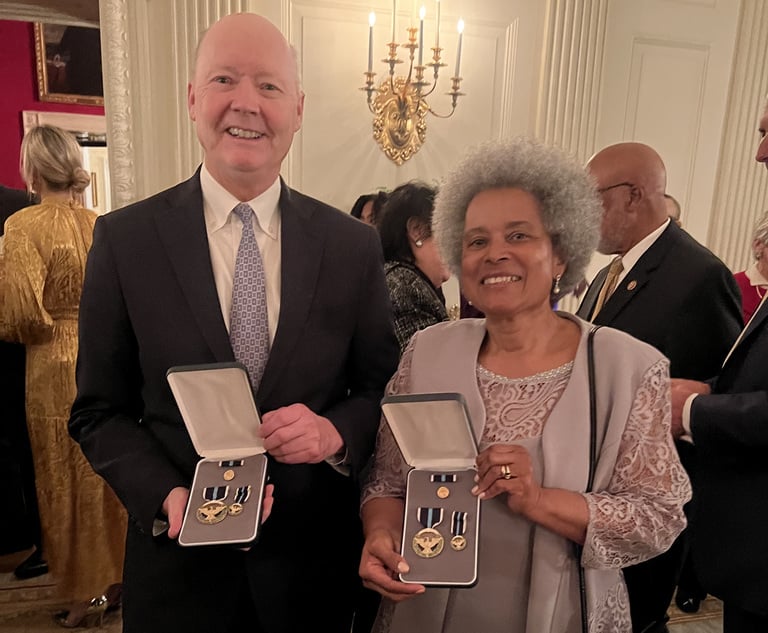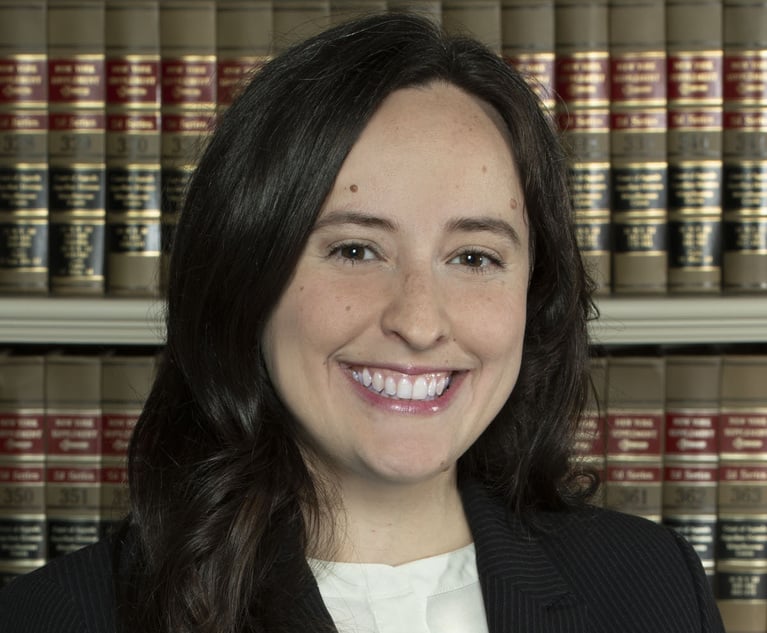Toliver Tapped to Resolve Row Over Alleged Use of Private Info on Opioid Treatment
A former Delaware judge has been appointed to determine whether Orexo AB violated a protective order from previous litigation in order to accuse generic drugmaker Actavis Elizabeth of infringing two patents for its opioid treatment drugs.
October 11, 2017 at 10:42 PM
11 minute read
The original version of this story was published on Delaware Law Weekly

A former Delaware judge has been appointed to determine whether Orexo AB violated a protective order from previous litigation in order to accuse generic drugmaker Actavis Elizabeth of infringing two patents for its opioid treatment drugs.
On Tuesday, U.S. District Judge Gregory M. Sleet of the District of Delaware said that retired Superior Court Judge Charles H. Toliver IV would act as special master in the case, tasked with addressing Actavis' allegations that Orexo had used confidential information to build its case seeking to boot Actavis' generic versions of Suboxone and Subutex from the market.
Actavis moved to dismiss the suit in April, arguing that Orexo's infringement allegations drew directly from confidential documents the company obtained during an earlier dispute over two patents for Orexo's Zubsolv drug, which is also used to combat opioid addiction.
In that case, Judge Sue L. Robinson determined that Actavis had infringed Orexo's so-called '996 patent but ruled a second patent, set to expire 13 years later, invalid as obvious. Actavis chose not to appeal the decision, and Orexo filed its current suit in February, asserting infringement of the '996 patent.
Actavis said the complaint was premised on confidential information about the chemical properties of its generics that could have only been obtained through discovery, which was restricted only to the Zubsolv litigation. And it faulted Orexo for waiting on the outcome of the previous case to raise its concerns about the Suboxone and Subutex generics.
“Orexo should have laid its cards on the table when it first received Actavis' confidential information,” its attorneys said in a redacted briefing.
“Instead, Orexo improperly sat on the information, remained silent about its intentions, and then without ever asking permission from Actavis or this court, misused Actavis' confidential information by bringing this case only after the '996 patent had already been litigated.”
Actavis said that it had already been selling its generics for years and that the timing of the suit was “no accident,” given the secret disclosures in the earlier litigation. It noted that 10 other manufactures selling similar products had not been sued in connection with their generics.
Orexo has rejected the allegations, saying they are “based solely on layer arguments and self-serving speculation.”
In its answering brief, Orexo said its allegations were derived from publicly available material, including expert analysis of Actavis' generics and information printed on the drugs' labels. Further testing of the tablets themselves revealed important details about the relationships between the generics' ingredients, Orexo said.
“Simply put, Orexo had no need to and did not use any Actavis confidential information to make any allegation in the complaint,” the company said.
Orexo, however, did not address Actavis' arguments regarding the timing of the lawsuit.
The dispute has raised a number of procedural issues, including whether discovery should continue and how exactly to determine whether a violation had occurred. Late last month, Sleet ordered both sides to submit additional documents, and attorneys for the companies met Sept. 25 in Wilmington to discuss their proposed plans for discovery.
Discussions, however, broke down, leading Sleet to name Toliver, now a partner with Morris James, to sort out the dispute.
In his order on Tuesday, Sleet said Toliver would be responsible for identifying any violations of the protective order and determining whether Actavis' allegations had met the requisite burden of proof.
Orexo was also ordered to submit to Toliver additional documents regarding its testing of Actavis' drugs and whether it had tested any other Suboxone and Subutex generics.
Attorneys for the companies were not immediately available to comment on Wednesday.
Actavis is represented by George C. Lombardi, Ivan M. Poullaos, Michael K. Nutter and Tyler G. Johannes of Winston & Strawn and David A. Bilson and John C. Phillips Jr. of Phillips, Goldman, McLaughlin & Hall.
Orexo is represented by Derek J. Fahnestock and Jack B. Blumenfeld of Morris, Nichols, Arsht & Tunnell.
The case is captioned Orexo v. Actavis Elizabeth.
Tom McParland can be contacted at 215-557-2485 or at [email protected]. Follow him on Twitter @TMcParlandTLI.

A former Delaware judge has been appointed to determine whether Orexo AB violated a protective order from previous litigation in order to accuse generic drugmaker Actavis Elizabeth of infringing two patents for its opioid treatment drugs.
On Tuesday, U.S. District Judge Gregory M. Sleet of the District of Delaware said that retired Superior Court Judge Charles H. Toliver IV would act as special master in the case, tasked with addressing Actavis' allegations that Orexo had used confidential information to build its case seeking to boot Actavis' generic versions of Suboxone and Subutex from the market.
Actavis moved to dismiss the suit in April, arguing that Orexo's infringement allegations drew directly from confidential documents the company obtained during an earlier dispute over two patents for Orexo's Zubsolv drug, which is also used to combat opioid addiction.
In that case, Judge Sue L. Robinson determined that Actavis had infringed Orexo's so-called '996 patent but ruled a second patent, set to expire 13 years later, invalid as obvious. Actavis chose not to appeal the decision, and Orexo filed its current suit in February, asserting infringement of the '996 patent.
Actavis said the complaint was premised on confidential information about the chemical properties of its generics that could have only been obtained through discovery, which was restricted only to the Zubsolv litigation. And it faulted Orexo for waiting on the outcome of the previous case to raise its concerns about the Suboxone and Subutex generics.
“Orexo should have laid its cards on the table when it first received Actavis' confidential information,” its attorneys said in a redacted briefing.
“Instead, Orexo improperly sat on the information, remained silent about its intentions, and then without ever asking permission from Actavis or this court, misused Actavis' confidential information by bringing this case only after the '996 patent had already been litigated.”
Actavis said that it had already been selling its generics for years and that the timing of the suit was “no accident,” given the secret disclosures in the earlier litigation. It noted that 10 other manufactures selling similar products had not been sued in connection with their generics.
Orexo has rejected the allegations, saying they are “based solely on layer arguments and self-serving speculation.”
In its answering brief, Orexo said its allegations were derived from publicly available material, including expert analysis of Actavis' generics and information printed on the drugs' labels. Further testing of the tablets themselves revealed important details about the relationships between the generics' ingredients, Orexo said.
“Simply put, Orexo had no need to and did not use any Actavis confidential information to make any allegation in the complaint,” the company said.
Orexo, however, did not address Actavis' arguments regarding the timing of the lawsuit.
The dispute has raised a number of procedural issues, including whether discovery should continue and how exactly to determine whether a violation had occurred. Late last month, Sleet ordered both sides to submit additional documents, and attorneys for the companies met Sept. 25 in Wilmington to discuss their proposed plans for discovery.
Discussions, however, broke down, leading Sleet to name Toliver, now a partner with
In his order on Tuesday, Sleet said Toliver would be responsible for identifying any violations of the protective order and determining whether Actavis' allegations had met the requisite burden of proof.
Orexo was also ordered to submit to Toliver additional documents regarding its testing of Actavis' drugs and whether it had tested any other Suboxone and Subutex generics.
Attorneys for the companies were not immediately available to comment on Wednesday.
Actavis is represented by George C. Lombardi, Ivan M. Poullaos, Michael K. Nutter and Tyler G. Johannes of
Orexo is represented by Derek J. Fahnestock and Jack B. Blumenfeld of
The case is captioned Orexo v. Actavis Elizabeth.
Tom McParland can be contacted at 215-557-2485 or at [email protected]. Follow him on Twitter @TMcParlandTLI.
This content has been archived. It is available through our partners, LexisNexis® and Bloomberg Law.
To view this content, please continue to their sites.
Not a Lexis Subscriber?
Subscribe Now
Not a Bloomberg Law Subscriber?
Subscribe Now
NOT FOR REPRINT
© 2025 ALM Global, LLC, All Rights Reserved. Request academic re-use from www.copyright.com. All other uses, submit a request to [email protected]. For more information visit Asset & Logo Licensing.
You Might Like
View All
Delaware Legal Figures Who Played Key Roles in Ending School Segregation Honored With Presidential Citizens Medal
3 minute read


Chancery Claims Linking Fox Management to Defamation Liability Clear Hurdle
4 minute readTrending Stories
- 1The Importance of Contractual Language in Analyzing Post-Closing Earnout Disputes
- 2People in the News—Jan. 8, 2025—Stevens & Lee, Ogletree Deakins
- 3How I Made Partner: 'Avoid Getting Stuck in a Moment,' Says Federico Cuadra Del Carmen of Baker McKenzie
- 4Legal Departments Dinged for Acquiescing to Rate Hikes That 'Defy Gravity'
- 5Spalding Jurors Return $12M Verdict Against State Farm Insurance Client
Who Got The Work
Michael G. Bongiorno, Andrew Scott Dulberg and Elizabeth E. Driscoll from Wilmer Cutler Pickering Hale and Dorr have stepped in to represent Symbotic Inc., an A.I.-enabled technology platform that focuses on increasing supply chain efficiency, and other defendants in a pending shareholder derivative lawsuit. The case, filed Oct. 2 in Massachusetts District Court by the Brown Law Firm on behalf of Stephen Austen, accuses certain officers and directors of misleading investors in regard to Symbotic's potential for margin growth by failing to disclose that the company was not equipped to timely deploy its systems or manage expenses through project delays. The case, assigned to U.S. District Judge Nathaniel M. Gorton, is 1:24-cv-12522, Austen v. Cohen et al.
Who Got The Work
Edmund Polubinski and Marie Killmond of Davis Polk & Wardwell have entered appearances for data platform software development company MongoDB and other defendants in a pending shareholder derivative lawsuit. The action, filed Oct. 7 in New York Southern District Court by the Brown Law Firm, accuses the company's directors and/or officers of falsely expressing confidence in the company’s restructuring of its sales incentive plan and downplaying the severity of decreases in its upfront commitments. The case is 1:24-cv-07594, Roy v. Ittycheria et al.
Who Got The Work
Amy O. Bruchs and Kurt F. Ellison of Michael Best & Friedrich have entered appearances for Epic Systems Corp. in a pending employment discrimination lawsuit. The suit was filed Sept. 7 in Wisconsin Western District Court by Levine Eisberner LLC and Siri & Glimstad on behalf of a project manager who claims that he was wrongfully terminated after applying for a religious exemption to the defendant's COVID-19 vaccine mandate. The case, assigned to U.S. Magistrate Judge Anita Marie Boor, is 3:24-cv-00630, Secker, Nathan v. Epic Systems Corporation.
Who Got The Work
David X. Sullivan, Thomas J. Finn and Gregory A. Hall from McCarter & English have entered appearances for Sunrun Installation Services in a pending civil rights lawsuit. The complaint was filed Sept. 4 in Connecticut District Court by attorney Robert M. Berke on behalf of former employee George Edward Steins, who was arrested and charged with employing an unregistered home improvement salesperson. The complaint alleges that had Sunrun informed the Connecticut Department of Consumer Protection that the plaintiff's employment had ended in 2017 and that he no longer held Sunrun's home improvement contractor license, he would not have been hit with charges, which were dismissed in May 2024. The case, assigned to U.S. District Judge Jeffrey A. Meyer, is 3:24-cv-01423, Steins v. Sunrun, Inc. et al.
Who Got The Work
Greenberg Traurig shareholder Joshua L. Raskin has entered an appearance for boohoo.com UK Ltd. in a pending patent infringement lawsuit. The suit, filed Sept. 3 in Texas Eastern District Court by Rozier Hardt McDonough on behalf of Alto Dynamics, asserts five patents related to an online shopping platform. The case, assigned to U.S. District Judge Rodney Gilstrap, is 2:24-cv-00719, Alto Dynamics, LLC v. boohoo.com UK Limited.
Featured Firms
Law Offices of Gary Martin Hays & Associates, P.C.
(470) 294-1674
Law Offices of Mark E. Salomone
(857) 444-6468
Smith & Hassler
(713) 739-1250






